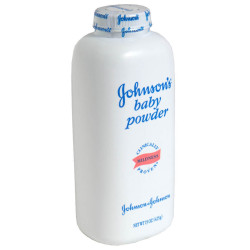Top Class Actions’s website and social media posts use affiliate links. If you make a purchase using such links, we may receive a commission, but it will not result in any additional charges to you. Please review our Affiliate Link Disclosure for more information.
While much attention has been drawn to the possible link between Johnson & Johnson’s talcum powder products and ovarian cancer, some medical experts remain unconvinced about the possible correlation.
According to one women’s healthcare provider, Dr. Panos Konstantinopoulos, a gynecological oncologist at the Dana-Farber Cancer Institute in Boston, the studies indicating the correlation between baby powder and cancer are incomplete because they lack sufficient data.
Konstantinopoulos points out that the studies that have been conducted to study the potential link are missing pieces. The studies lack the patients’ family history of whether they have had ovarian or breast cancer and do not approximate for how long each patients used the powder, he said.
His concern surrounds the recent concern of whether talcum powder may cause women ovarian cancer. Johnson & Johnson has been implicated in several product liability lawsuits, with plaintiffs alleging that either the company’s Shower-to-Shower and popular Baby Powder caused them to develop ovarian cancer after applying it to their genital area. Multiple studies have suggested that regular use of talcum powder in this sensitive region may increase the risk of ovarian cancer because the talc powder enters the bloodstream and then travel up the ovaries.
The research conducted has produced mixed results, with some studies only finding a small increase in risk. For example, a study published in 2013 conducted at Brigham and Women’s Hospital found a 25 percent increased risk of ovarian cancer for women who used talcum powder in their genital area. However, other studies have not shown any signs of an elevated risk.
“In general, population-based studies have shown a statistically significant association with ovarian cancer risk, while hospital-based studies showed that this association is not statistically significant. In addition, none of the studies found that risk rose with increased exposure to the powder, and there is no evidence that talcum powder use on other parts of the body affects ovarian cancer risk,” Konstantinopoulos said.
When Konstantinopoulos talks to his patients, he said that he tells them that the data collected in these studies is controversial, and even if there is a risk, it is likely to be very small. Additionally, Konstantinopoulos notes that the International Agency for Research on Cancer (IARC) has classified talc-based body power as possibly cancerous to human beings.
According to the American Cancer Society, an estimated 21,980 women will develop ovarian cancer, with 14,270 of them in the United States. While the exact number of these cases being linked to talcum powder use is unknown, a meta-analysis of data from eight separate studies determined that out of 8,525 women diagnosed with ovarian cancer, nearly a quarter of them had used talcum powder in the genital area.
Researchers explain that when talc is applied to the genital area, the particles can travel into the body and trigger inflammation, which allows cancer cells to spread. These tiny particles can last inside a woman’s body for years, allowing scientists to find them after the patient has passed.
It has been alleged that Johnson & Johnson had known about this risk for decades, but had chosen not to warn the public. A number of product liability lawsuits have been filed against the company alleging false advertising, deceptive marketing, and concealing vital product safety information.
In general, talcum powder ovarian cancer lawsuits are filed individually by each plaintiff and are not class actions.
Do YOU have a legal claim? Fill out the form on this page now for a free, immediate, and confidential case evaluation. The attorneys who work with Top Class Actions will contact you if you qualify to let you know if an individual lawsuit or class action lawsuit is best for you. Hurry — statutes of limitations may apply.
ATTORNEY ADVERTISING
Top Class Actions is a Proud Member of the American Bar Association
LEGAL INFORMATION IS NOT LEGAL ADVICE
Top Class Actions Legal Statement
©2008 – 2024 Top Class Actions® LLC
Various Trademarks held by their respective owners
This website is not intended for viewing or usage by European Union citizens.
Get Help – It’s Free
Join a Free Baby Powder Cancer Class Action Lawsuit Investigation
If you used Johnson’s Baby Powder, Shower to Shower, or another talcum powder product and were diagnosed with ovarian cancer, you may have a legal claim. Family members of loved ones who died of ovarian cancer can also join. Submit your information now for a free case evaluation.
An attorney will contact you if you qualify to discuss the details of your potential case at no charge to you.













